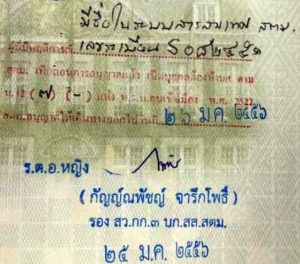Case Visa (Defendant’s Visa)
Case Visa (Defendant’s Visa)
Thailand Bail’s lawyers and solicitors are experts in any area of law pertaining to criminal cases in Thailand. In our article entitled, “What Most Thai Lawyers Don’t Tell You,” we discussed how most Thai solicitors do not understand or care about defendants’ legal status in Thailand. However, Thailand Bail is different, and we care deeply about every element of your journey as a defendant in Thailand, including your immigration status in Thailand. On this page, we will discuss in-depth the need for a case visa, which is also known as a defendant’s visa, while waiting for the police the finish investigating your criminal case in Thailand, as well as during the criminal case proceedings in the courts of Thailand.
The Case for the Case Visa (Why You Need This Thai Visa)

When you enter Thailand, if you come from a list of certain countries, you are given a 30-day visa-exempt status stamp in your passport. This is not a visa. As several visa experts in Thailand have pointed out, there is a difference between having a 30-day visa exempt status and having a 30-day tourist visa or other type of visa in Thailand. You may have entered Thailand on a Thai tourist visa, granted to you from one of the Royal Thai Embassies around the world, or perhaps you received a visa on arrival (VOA) when you arrived at the airport or border. For longer-term foreigners, you may have applied for and received a non-immigrant “B” business visa for working, a non-immigrant “O” visa for staying with family or for retirement. Regardless of the visa you entered Thailand on, you must stay legal whilst in Thailand, awaiting investigation or awaiting trial. Surprisingly, most defendants that we meet are not aware of this, and think that if the police or the court has kept their passports, they are not responsible for their visas anymore. This is incorrect and could lead to further imprisonment, fines, and otherwise causing issues for your legal status in Thailand.
Potential Consequences for Ignoring the Case Visa

As mentioned above, many defendants in Thailand ignore their visa situation because their passports are with the police or with the court. However, this is not the correct approach to the situation if you have a criminal case in Thailand. If you do not have a valid visa while the police are investigating your case or while you are waiting for trial in one of the courts in Thailand, you will face consequences according to the immigration laws of Thailand. Specifically, you could be re-arrested if you are out on bail. This could happen when you show up to court for your next court appearance, reporting, or other appearance. We have seen this happen to others, who are shocked and dismayed when they get detained at the court for not having a valid visa. Being re-arrested can also lead to bail being revoked, although this decision is ultimately up to the judge. Again, we have seen people show up to court, only to be arrested and sent back to prison without notice. Additionally, not having a valid Thai case visa will affect your chances for bail. If you are waiting for bail, the court is less likely to give bail to someone who does not have a valid Thai visa in their passport. Finally, not having a case visa will lead to deportation, blacklisting, and other immigration problems. This may not seem like a serious issue, but be sure – getting locked up in the Thai Immigration Detention Centre (IDC) is a very unpleasant situation. In order to summarize the above paragraph, the main consequences of not having a Thai case visa are as follows:
- If you do not have a Thai case visa (defendant’s visa), whilst out on bail, you might be re-arrested when you go to court for your next court date. You will also be charged with another criminal charge, and this will increase your potential penalty, including jail time and fines.
- If you do not have a Thai case visa (defendant’s visa), whilst still in prison awaiting bail, you will be charged with another criminal charge, and this reduces your chances for bail and increases the potential penalty you will receive, including more jail time and higher fines.
- If you do not have a Thai case visa (defendant’s visa), either in prison or whilst out on bail, when your case is over, you will not be released, but will be detained by immigration, sent to the local immigration detention centre (IDC), transferred to the main immigration detention centre (IDC) in Bangkok, and then imprisoned there until you can fulfill the peculiar requirements of the Thai immigration officers there. This can take weeks to resolve, while you stay in conditions that are worse than Klong Prem Prison in Nonthaburi (Bangkok).
How to Get a Thai Case Visa

The information you have just read is not meant to scare you or make you more nervous if you have a criminal case in Thailand, but it is meant to cause you to act on this and get your Thai case visa (defendant’s visa). Thailand Bail’s Thai solicitors and legal staff are fully capable of providing support for the complicated case visa application process. It takes multiple appearances at the court and the immigration department. The normal visa agents in Bangkok, Chiang Mai, Phuket, Pattaya, Koh Samui, and elsewhere are not aware of the requirements for this type of visa, and everyone we have met who hired a normal Thai visa agent to manage this has been denied the visa from immigration. Thailand Bail is not a visa agent, and we do not typically handle visa applications, but we do offer the case visa service, since it is so closely related to criminal cases in Thailand.
The first step to get your Thai case visa is to contact Thailand Bail, send us your current visa stamp, and a brief description of your case. If you already have a Thai solicitor, Thai lawyer, or other Thai legal professional working on your case, we can offer to just handle the case visa for you. Once we discuss the details of your visa and case situation, we can provide a timeline and solution to apply for and receive your case visa. Our case visa service is guaranteed, and this will be clearly shown in the proposal we send to you.
We can usually schedule appointments for case visas within a few days, but it is important to contact us at least 1 week before a visa expires so we can schedule the necessary lawyers and staff to prepare the documents and manage the case visa application.
Further Information
If you would like to read some stories related to the case visa and its importance for people who have criminal cases in Thailand, please read our news article “What Most Thai Lawyers Don’t Tell You – The Case Visa” in our blog section of the Thailand Bail website. Our solicitors in Thailand are waiting to assist you.



Comments
[…] Case Visa (Defendant’s Visa) […]